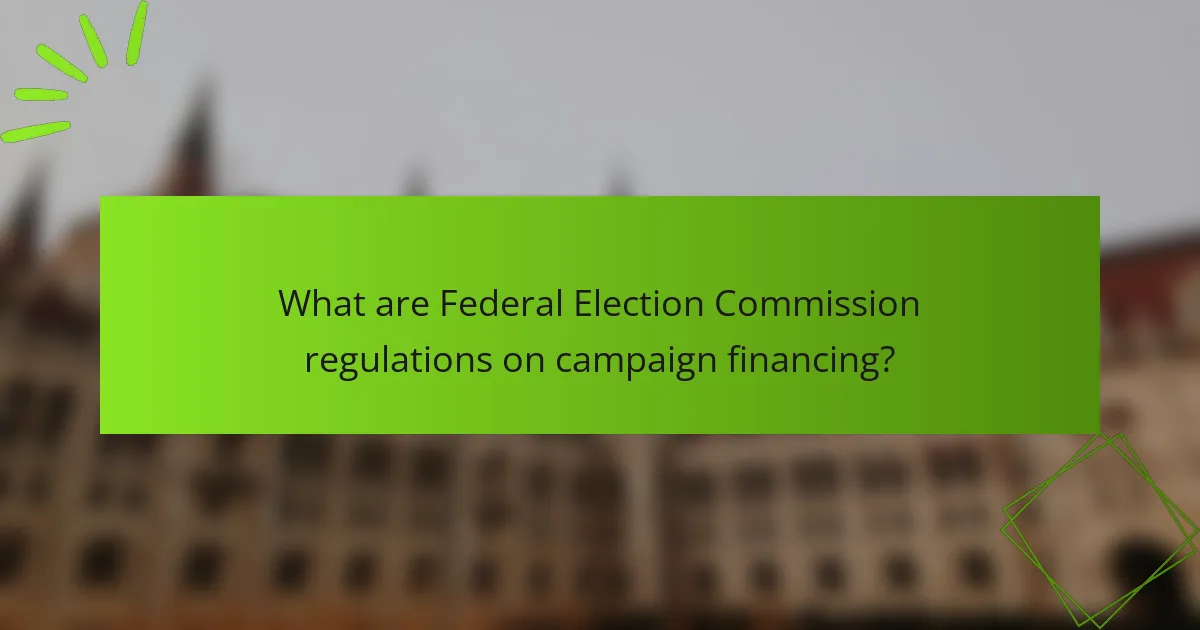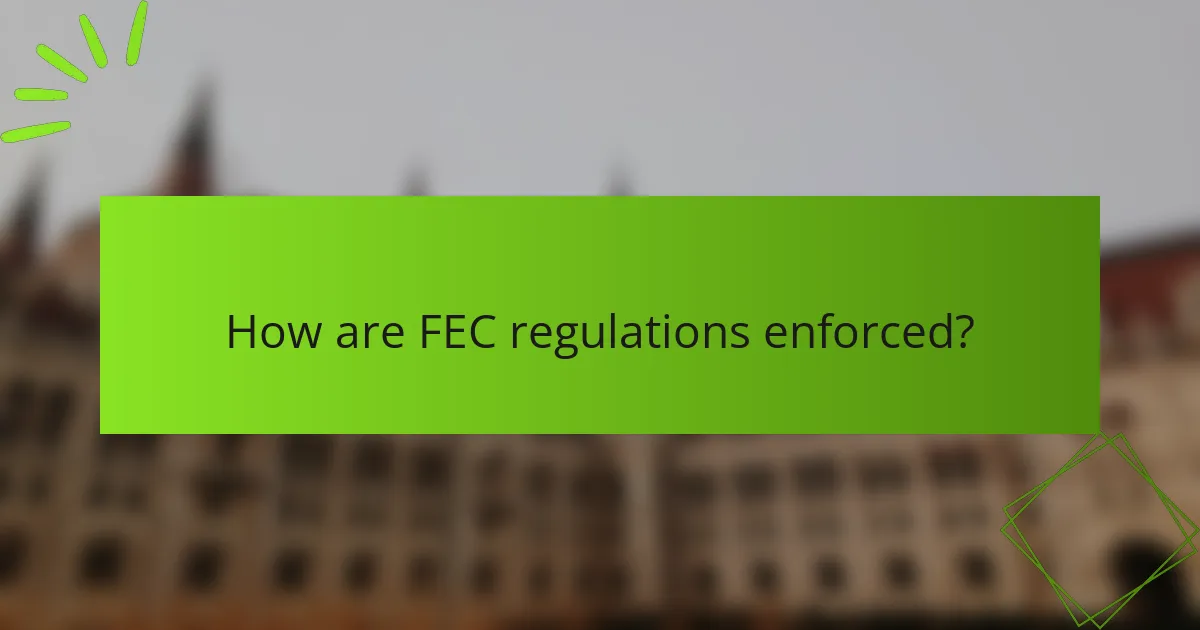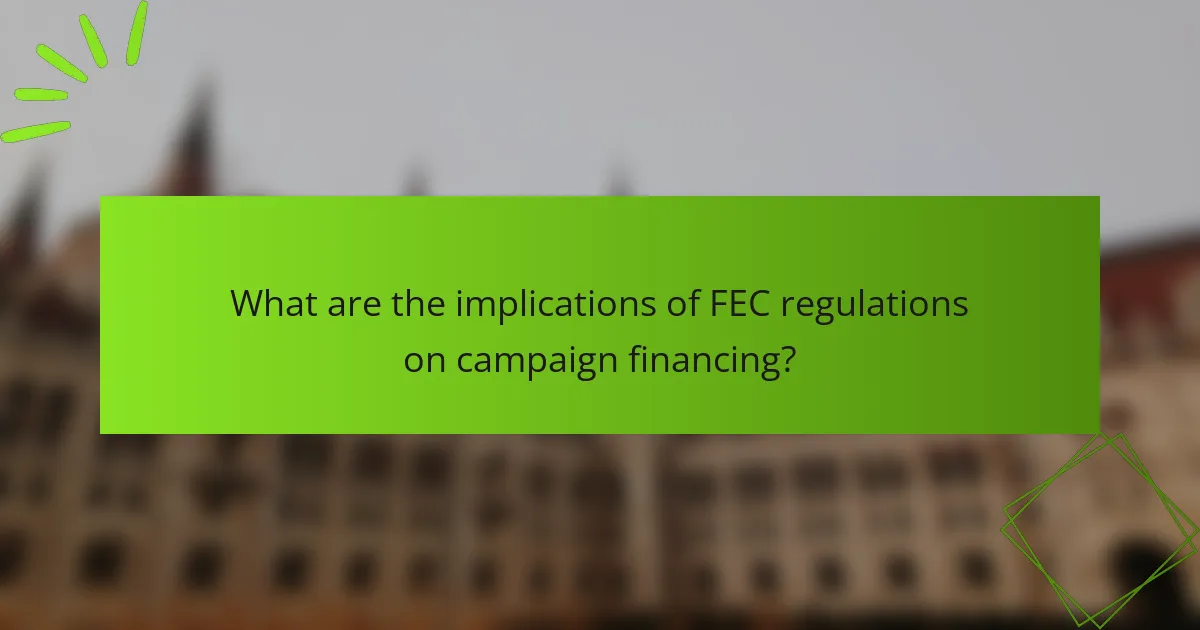Federal Election Commission (FEC) regulations govern campaign financing in the United States by establishing limits on contributions to candidates and political parties. Individuals can donate up to $2,900 per election to a candidate, while political action committees (PACs) may contribute up to $5,000. The FEC mandates transparency through financial disclosures of campaign contributions and expenditures, ensuring compliance with financing laws. It also prohibits foreign contributions and enforces regulations through monitoring, audits, and penalties for non-compliance. These regulations play a crucial role in promoting accountability in political funding and shaping the landscape of campaign financing.

What are Federal Election Commission regulations on campaign financing?
Federal Election Commission (FEC) regulations govern campaign financing in the United States. These regulations set limits on contributions to candidates and political parties. Individuals can contribute a maximum of $2,900 per election to a candidate. Political action committees (PACs) can contribute up to $5,000 per election to a candidate. The FEC requires candidates to disclose their campaign finances, including contributions and expenditures. This transparency helps ensure compliance with financing laws. The regulations also prohibit foreign contributions to U.S. campaigns. Violations of these regulations can result in penalties and fines.
How do these regulations impact political campaigns?
Federal Election Commission regulations significantly impact political campaigns by controlling the flow of campaign financing. These regulations limit contributions from individuals and organizations to ensure transparency and fairness. For example, individuals can only contribute a maximum of $2,900 per election to a candidate. This restriction aims to prevent excessive influence from wealthy donors. Additionally, campaigns must disclose their financial activities, providing public access to funding sources. This transparency helps voters make informed decisions. Violations of these regulations can result in fines or legal consequences, deterring misconduct. Overall, these rules shape the strategic approach of campaigns regarding fundraising and spending.
What are the key components of the regulations?
The key components of the Federal Election Commission regulations on campaign financing include contribution limits, disclosure requirements, and expenditure restrictions. Contribution limits cap the amount individuals and entities can donate to candidates and political parties. For instance, individuals can contribute up to $2,900 per election to a candidate. Disclosure requirements mandate that candidates and committees report their contributions and expenditures to ensure transparency. This includes itemizing contributions over $200. Expenditure restrictions govern how campaign funds can be spent, prohibiting the use of funds for personal expenses. These components work together to maintain the integrity of the electoral process and promote fair competition among candidates.
How do these components shape campaign financing?
The components of Federal Election Commission regulations shape campaign financing by establishing rules for contributions and expenditures. These regulations limit the amount individuals and organizations can donate to candidates. They also require transparency through reporting of contributions and spending. Such transparency helps prevent corruption and promotes accountability. Additionally, regulations dictate how funds can be used, ensuring they are allocated for campaign-related activities. This structure influences the overall financial strategies of campaigns. Compliance with these regulations is monitored by the FEC, which enforces penalties for violations. Therefore, these components create a framework that governs the financial landscape of political campaigns.
Why were these regulations established?
These regulations were established to ensure transparency in campaign financing. The Federal Election Commission (FEC) was created in response to concerns about corruption in political funding. Regulations aim to limit the influence of money in elections. They require candidates and parties to disclose contributions and expenditures. This transparency helps voters make informed decisions. Additionally, regulations prevent excessive contributions from individuals and organizations. They promote fair competition among candidates. The establishment of these regulations was also influenced by historical events, such as the Watergate scandal, which highlighted the need for reform.
What historical events led to the creation of these regulations?
The creation of Federal Election Commission regulations on campaign financing was influenced by several historical events. The Watergate scandal in the early 1970s revealed extensive campaign finance abuses. This scandal led to public outcry and demands for reform. In response, Congress passed the Federal Election Campaign Act (FECA) in 1971. This act aimed to regulate campaign contributions and expenditures. Amendments to FECA in 1974 established stricter limits and created the Federal Election Commission. The Supreme Court’s ruling in Buckley v. Valeo in 1976 further shaped these regulations by distinguishing between contributions and independent expenditures. These historical events collectively established the framework for campaign financing regulations in the United States.
How have public perceptions of campaign financing influenced these regulations?
Public perceptions of campaign financing have significantly influenced Federal Election Commission regulations. Increased public concern about the influence of money in politics led to demands for transparency. This resulted in regulations requiring detailed disclosure of campaign contributions. For instance, the Bipartisan Campaign Reform Act of 2002 was enacted in response to public outcry over soft money contributions. Surveys show that a majority of voters support stricter limits on campaign spending. This public sentiment has pressured lawmakers to implement reforms aimed at reducing the impact of money in elections. Consequently, the FEC has adjusted its regulations to align with these evolving public expectations.
What are the main types of regulations enforced by the FEC?
The main types of regulations enforced by the FEC include contribution limits, expenditure limits, and disclosure requirements. Contribution limits restrict the amount individuals and organizations can donate to candidates and political parties. Expenditure limits govern how much candidates can spend on their campaigns. Disclosure requirements mandate that candidates and political committees report their financial activities, including contributions and expenditures. These regulations aim to promote transparency and prevent corruption in the electoral process. The FEC enforces these regulations through audits and investigations to ensure compliance.
What limits are placed on individual contributions?
The Federal Election Commission (FEC) limits individual contributions to federal candidates to $2,900 per election. This limit applies to both primary and general elections. Additionally, individuals may contribute up to $5,000 per year to political action committees (PACs). Contributions to national party committees are capped at $36,500 per year. These limits are established to ensure transparency and fairness in campaign financing. The FEC enforces these regulations to maintain the integrity of the electoral process.
How do regulations address corporate and union contributions?
Regulations address corporate and union contributions by establishing specific rules on how these entities can participate in campaign financing. The Federal Election Commission (FEC) prohibits direct contributions from corporations to candidates. However, corporations can engage in independent expenditures to support candidates. Unions face similar restrictions; they cannot directly contribute to candidates but can create political action committees (PACs) to collect voluntary contributions from members for political purposes. These regulations aim to ensure transparency and limit the influence of large entities in elections. The FEC enforces these rules through reporting requirements and penalties for violations.

How are FEC regulations enforced?
FEC regulations are enforced through a combination of monitoring, investigations, and penalties. The Federal Election Commission oversees compliance with campaign finance laws. It conducts audits of campaign finance reports submitted by candidates and political committees. If violations are suspected, the FEC may initiate investigations. This process can lead to fines or other penalties for non-compliance. The FEC also provides guidance to help entities understand and adhere to regulations. Public disclosure of campaign finance information promotes transparency and accountability. Enforcement actions are documented and can be found in the FEC’s official records.
What mechanisms are in place for monitoring compliance?
The Federal Election Commission (FEC) employs several mechanisms for monitoring compliance with campaign financing regulations. These mechanisms include mandatory reporting requirements for candidates and political committees. Entities must file detailed financial reports that disclose contributions and expenditures. The FEC conducts audits and investigations to ensure adherence to the rules. It also reviews complaints and tips from the public regarding potential violations. Additionally, the FEC provides guidance and educational resources to help entities understand their obligations. These measures collectively ensure transparency and accountability in campaign financing.
How does the FEC investigate potential violations?
The Federal Election Commission (FEC) investigates potential violations through a systematic process. Initially, the FEC receives complaints from various sources, including individuals and organizations. After receiving a complaint, the FEC reviews the allegations for sufficient merit. If deemed credible, the FEC may initiate an investigation. The investigation involves gathering evidence, which may include documents and testimonies. The FEC also has the authority to issue subpoenas to obtain necessary information. Upon completing the investigation, the FEC decides whether to pursue enforcement actions. Enforcement actions can include fines or other penalties for violations. This process ensures compliance with campaign finance laws and regulations.
What penalties can be imposed for non-compliance?
Penalties for non-compliance with Federal Election Commission regulations on campaign financing can include fines, legal action, and potential criminal charges. Fines can range from hundreds to thousands of dollars, depending on the severity of the violation. Legal actions may involve lawsuits or enforcement proceedings initiated by the FEC. Criminal charges can lead to imprisonment for serious offenses, such as willful violations of campaign finance laws. Historical data shows that the FEC has imposed penalties on various entities for failing to adhere to these regulations, reinforcing the importance of compliance.
How do FEC regulations interact with state laws?
FEC regulations set federal standards for campaign financing, while state laws can impose additional requirements. The interaction occurs when state laws complement or conflict with federal regulations. For example, states may have stricter contribution limits than the FEC. Additionally, some states require disclosure of campaign financing sources beyond federal requirements. This dual framework can create complexities for candidates and political committees. Courts have upheld the principle that federal law preempts conflicting state laws. However, states retain authority to regulate aspects of campaign financing that do not conflict with federal regulations. This interaction is crucial for ensuring compliance in elections.
What are the differences between federal and state campaign financing laws?
Federal and state campaign financing laws differ primarily in their regulations and contribution limits. Federal laws are governed by the Federal Election Commission (FEC) and apply to federal elections. They set strict contribution limits for individuals, corporations, and political action committees (PACs). For instance, individuals can contribute up to $2,900 per election to a candidate.
State laws vary significantly by jurisdiction. Each state has its own rules regarding contribution limits and reporting requirements. Some states allow higher contribution limits than federal laws. Additionally, states may have different regulations on the sources of campaign funding, including the acceptance of contributions from corporations or unions.
Federal laws require detailed reporting of campaign finances, including the sources and amounts of contributions. State laws may have less stringent reporting requirements, with some states allowing more anonymity in contributions. This variability can lead to differences in transparency and accountability across state lines.
In summary, federal campaign financing laws are uniform and regulated by the FEC, while state laws are diverse and can vary widely in terms of contribution limits and reporting requirements.
How do states implement their own regulations alongside FEC rules?
States implement their own regulations alongside FEC rules by creating additional laws governing campaign financing. Each state has the authority to establish its own contribution limits and reporting requirements. States may also regulate the use of campaign funds differently than federal standards. For example, some states have stricter rules on corporate contributions. States must ensure their regulations do not conflict with federal laws. The FEC allows states to impose their own rules as long as they do not violate federal guidelines. This dual system enables states to address local political concerns. Many states regularly update their regulations to reflect changing political landscapes.

What are the implications of FEC regulations on campaign financing?
FEC regulations significantly impact campaign financing by establishing rules for contribution limits and disclosure requirements. These regulations aim to promote transparency in political funding. They restrict the amount individuals and organizations can contribute to candidates and political committees. For example, in the 2021-2022 election cycle, individuals could donate up to $2,900 per candidate per election. Additionally, the FEC requires candidates to disclose their donors and expenditures. This transparency helps voters understand the financial backing of candidates. Noncompliance with these regulations can result in penalties, including fines. Thus, FEC regulations shape the landscape of political contributions and accountability.
How do these regulations affect fundraising strategies?
Federal Election Commission regulations significantly impact fundraising strategies. These regulations impose limits on contributions to candidates and political committees. They require detailed reporting of donations and expenditures. Compliance with these rules shapes how campaigns approach fundraising. Campaigns must strategize to maximize contributions while adhering to legal limits. Transparency requirements influence donor engagement and public perception. For instance, campaigns may focus on smaller donations to diversify funding sources. Overall, regulations necessitate careful planning and execution of fundraising efforts.
What are best practices for compliance in fundraising?
Best practices for compliance in fundraising include understanding and adhering to Federal Election Commission (FEC) regulations. Organizations must maintain accurate financial records of all contributions and expenditures. They should also ensure timely reporting of donations, as required by law. Transparency in fundraising activities is essential to build trust with donors and the public. It is important to verify the eligibility of contributors to avoid accepting prohibited funds. Training staff on compliance measures can minimize the risk of violations. Regular audits can help identify and rectify any compliance issues. Following these practices helps organizations avoid penalties and maintain their credibility.
How can campaigns effectively navigate FEC regulations?
Campaigns can effectively navigate FEC regulations by understanding compliance requirements. This includes knowing contribution limits and reporting deadlines. Campaigns must keep accurate records of all donations and expenditures. Utilizing FEC resources can provide guidance on legal obligations. Regular training for campaign staff on regulations is essential. Engaging legal counsel familiar with election law can prevent violations. Monitoring changes in regulations helps maintain compliance. Transparency in financial dealings builds public trust and accountability.
What challenges do candidates face under these regulations?
Candidates face several challenges under Federal Election Commission regulations on campaign financing. Strict contribution limits can hinder fundraising efforts. These limits often restrict the amount of money individuals and organizations can donate. Additionally, candidates must navigate complex reporting requirements. Failure to comply with these regulations can lead to severe penalties. Transparency mandates require detailed disclosure of campaign finances. This can expose candidates to public scrutiny and potential backlash. Lastly, candidates may struggle with the competitive landscape created by these regulations, as some may have greater access to resources.
How do changes in regulations impact campaign strategies?
Changes in regulations significantly impact campaign strategies by altering the rules governing financing and advertising. For instance, stricter contribution limits may force campaigns to diversify their funding sources. This can lead to increased grassroots fundraising efforts. Additionally, new disclosure requirements may necessitate greater transparency in campaign spending. Campaigns may need to adapt their messaging to comply with these regulations. Failure to comply can result in penalties that affect campaign viability. Historical examples include the Bipartisan Campaign Reform Act of 2002, which reshaped how campaigns raised and spent money. Overall, regulatory changes compel campaigns to be more strategic and adaptable in their approaches.
What are common pitfalls candidates encounter with FEC rules?
Candidates commonly encounter pitfalls with FEC rules related to improper reporting. Many fail to accurately disclose contributions and expenditures. This can lead to fines and penalties. Another issue is exceeding contribution limits. Candidates sometimes accept funds beyond the legal threshold. Misunderstanding the rules regarding in-kind contributions is also common. Some candidates misclassify these contributions, leading to compliance issues. Additionally, candidates often neglect to maintain proper records. This oversight can complicate audits and investigations. Awareness of these pitfalls is crucial for compliance with FEC regulations.
What resources are available for understanding FEC regulations?
The Federal Election Commission (FEC) provides several resources for understanding FEC regulations. These resources include the FEC’s official website, which offers comprehensive guides and educational materials. The website features a section dedicated to frequently asked questions about campaign finance laws. Additionally, the FEC publishes advisory opinions that clarify specific regulatory issues. The agency also conducts training sessions and webinars for candidates and political committees. Furthermore, the FEC’s enforcement division provides information on compliance and reporting requirements. These resources are essential for anyone seeking to navigate the complexities of campaign finance regulations.
Where can candidates find guidance on compliance?
Candidates can find guidance on compliance with Federal Election Commission regulations on the official FEC website. The website offers comprehensive resources including regulations, advisory opinions, and compliance manuals. Additionally, candidates can access educational webinars and training sessions provided by the FEC. These resources are designed to help candidates understand their obligations under campaign finance law. The FEC also provides a contact page for direct inquiries regarding compliance questions. This ensures candidates receive accurate and timely information.
What tools are available for tracking campaign financing?
Tools available for tracking campaign financing include the Federal Election Commission’s (FEC) online database. This database provides access to campaign finance reports and data submitted by candidates and committees. Additionally, platforms like OpenSecrets.org offer comprehensive tracking of campaign contributions and expenditures. These tools aggregate data from various sources, making it easier to analyze financial activities. The FEC database is updated regularly, ensuring accurate and timely information. OpenSecrets.org is maintained by the Center for Responsive Politics, a non-profit organization. These resources help users understand the flow of money in politics.
Federal Election Commission (FEC) regulations govern campaign financing in the United States, establishing contribution limits, disclosure requirements, and expenditure restrictions to ensure transparency and fairness in political funding. Individuals can contribute a maximum of $2,900 per election to candidates, while political action committees (PACs) can donate up to $5,000. These regulations were created in response to historical events, including the Watergate scandal, to limit the influence of money in elections and promote fair competition. The FEC enforces compliance through audits and penalties for violations, impacting fundraising strategies and candidate behavior in the electoral process.
